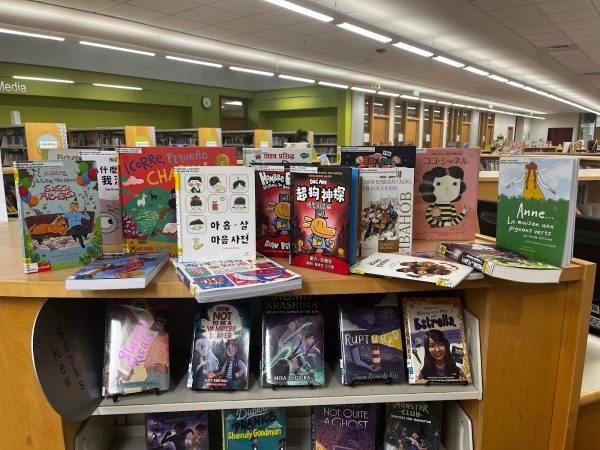The Youth International Collection at the Novi Public Library recently received an anonymous donation of $10,000 to enrich the selection, a donation which Shannon O’Leary, the international librarian for the Novi Public Library, is very thankful for.
O’Leary, who speaks Japanese, Spanish and English, has been the international librarian since 2016.
When O’Leary began managing the international collection, it wasn’t circulating well due to its remote location. The Youth International Collection now holds a central position right behind the first floor circular information desk, allowing library-goers to easily pick out a few books in a language that interests them. The Adult International Collection can still be found upstairs behind the business section.

The Youth International Collection at the Novi Public Library offers books in languages including Korean, Mandarin Chinese, French, Spanish, and more.
(Rebecca Borlace)
“Everybody’s learning another language,” O’Leary said.
O’Leary said knowing multiple languages can also make you more marketable when job hunting. Out of college, she received many callbacks on jobs due to speaking so many languages. She’s benefited from being multilingual while traveling in Japan and Mexico and here in Novi through being able to communicate with people at the library who aren’t fluent in English.
After many years as the Novi Public Library’s international librarian, O’Leary said that she still enjoys her job very much, but acknowledges that managing the international collection poses some unique challenges–particularly with how much more expensive international books have gotten recently. In fact, most books are getting more expensive, not just international books. Book Riot, the largest independent editorial book site in North America, used quotes from experts to explain rising book prices as a result of the increasing costs of paper. More and more paper mills have started producing less book paper in favor of other more profitable paper products in light of the backlash against plastic products. Kelly Jenson, a former librarian and an editor at Book Riot, examined how much book prices have increased since 2019. Using the top 10 titles from Publisher’s Weekly from 2019-2023, Jenson found that adult book prices have increased by 7.7% and children’s book prices increased by 30%.
These increasing book prices especially impact international books. O’Leary said sourcing and shipping costs could make just one book cost anywhere from $40-120, depending on the language. In a given year, O’Leary has anywhere from $1,500-2,000 allocated to use on the international collection at the library, which covers books all across the eight languages the Youth International Collection currently holds (Spanish, Mandarin Chinese, French, German, Hindi, Korean, Tamil, and Telugu). O’Leary is grateful for her budget, though, because many smaller libraries don’t have that kind of money to spend on international books, even if they have a diverse community that wants to see more international materials.
Beyond the high costs for international books, sourcing the materials is a big challenge.
“It’s not a one stop shop,” O’Leary said. “Unlike with English materials, [where] you can really go to any bookstore or any online retailer and purchase them, you really can’t do that with international materials.”
O’Leary said the hardest languages to find books in are Indian languages, and due to the library’s vendor criteria, there is essentially only one vendor she can source books in Indian languages from. With lower selection options from international book vendors, O’Leary said it’s very difficult to honor book requests for international materials. The Novi Public Library was very fortunate to have the Tamil Aarvalargal Group donate 200 youth and 200 adult books in Tamil because they wanted more specific books for their community.
In addition to the challenges of obtaining the books, O’Leary has to create a way for people to search for them. She says that all of the information on the book goes into the library catalog in English, which is an issue when the book title isn’t in English. To properly catalog the book, she must transfer the book over to tech services for them to handle, making the process more complicated than for materials in English.
O’Leary acknowledges that even with more resources available, that doesn’t necessarily mean that the collection will grow: not having enough space is also an issue.
“We get a ton of international donations in a ton of different languages… [but] we can’t take them all. We can’t fit them,” she said.
But, she does offer them up for other libraries to take, and they want them.
“Many libraries would love to have an international collection as big as ours. Again, it all goes back to affordability, time and resources. So, when you offer those up to the wider community and you see how fast those go…you can tell other libraries are hungry for books in different languages,” O’Leary said.







